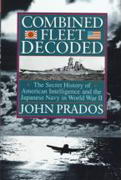Combined Fleet Decoded
 By John Prados
By John Prados
Reviewed by Michael Peck
Welcome to a story of how riches became rags.
In 1941 the Imperial Japanese Navy swept the Pacific with fleets like typhoons and aircraft like hawks; by 1945, its ships lay rusting on the sea bed, even as its pilots were reduced to crashing into enemy ships. What lay behind this tale of the Cinderella of the Seas whose glory rose with the Rising Sun and faded in the darkness of atomic fallout?
How neatly author John Prados expresses it: "The difficulty in explaining the Pacific War lies not in describing how Allied Forces did so well, but in detailing how Japan fared so poorly."
Was Japan merely drowned beneath the output of the humming Detroit factories? Or was it betrayed by its overconfidence in the "superiority" of the "divine race"? These are common explanations, yet Prados believes there is something more. "Intelligence remains the missing piece in the puzzle of explaining the Pacific War," he writes.
That's a tall statement. Too many blunders by too many of today's spy agencies have left us feeling that intelligence is anything but. Yet over decades the truth about World War II has dripped out of declassified files, eating away at the myth of Allied victories once seen as miracles, or Allied commanders who coyly hinted at their own intuition at anticipating enemy plans. Now we know that breaking major Axis codes such as Germany's famous Enigma gave the Allies an incredible, priceless look into the minds of their opponents.
But the fascination of Combined Fleet Decoded is that it looks beyond the big code break-ins. It is also the story of the Great Radio Intelligence War - the painstaking science and art of listening in on the enemy's communications. The process in painstaking and demanding; resources must be allocated so enemy signals can be tracked (even if you can't break the code, you can determine who sent the message and where they are). Does a sudden spurt of messages signal an enemy offensive? Or is he broadcasting false messages to fool you (as when the Japanese pretended their carriers were home even as they steamed toward Pearl Harbor)? Most important of all, do you analyze this information and distribute it to the field commanders? The Americans did all of these things. The Japanese didn't. Draw your own conclusions.
 TempBook
TempBook